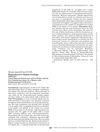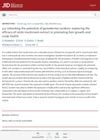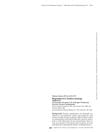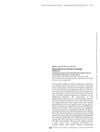36 citations,
December 2009 in “Skin pharmacology and physiology” Helium-neon laser treatment can stimulate hair growth in mice.
August 2019 in “Chin J Naut Med & Hyperbar Med” Hyperbaric oxygen therapy improves hair growth and quality of life in androgenic alopecia patients.
5 citations,
June 2018 in “Elsevier eBooks” Testosterone is important for male sexual traits, reproduction, muscle and bone health, blood production, and metabolism, and works both directly and after being changed into other hormones.
 May 2023 in “Journal of Ethnopharmacology”
May 2023 in “Journal of Ethnopharmacology” The wild garlic plant, Allium macrostemon Bunge, can promote hair growth and could potentially be used to treat hair loss.
 January 2023 in “Sovremennye problemy nauki i obrazovaniâ”
January 2023 in “Sovremennye problemy nauki i obrazovaniâ” Miliacin may help prevent hair loss and improve hair growth in mice with a condition similar to human baldness.
29 citations,
May 1975 in “Clinical Endocrinology” Combination therapy significantly reduces testosterone and moderately reduces hair growth in women with hirsutism.
 1 citations,
January 2022 in “BMC Genomic Data”
1 citations,
January 2022 in “BMC Genomic Data” The study found that androgen receptors in skin cells mainly affect the focal adhesion pathway and control the caveolin-1 gene, with implications for new treatments for related diseases.
 1 citations,
October 2022 in “Adolescent Health, Medicine and Therapeutics”
1 citations,
October 2022 in “Adolescent Health, Medicine and Therapeutics” Gender-affirming therapy can cause skin issues like acne and hair loss in transgender adolescents, and more research is needed on its dermatological effects.
 32 citations,
April 1999 in “Expert Opinion on Investigational Drugs”
32 citations,
April 1999 in “Expert Opinion on Investigational Drugs” Finasteride effectively treats male hair loss, improving growth and density.
Testosterone and dihydrotestosterone can slow down the growth of certain hair follicle cells.
 November 2022 in “Journal of the Endocrine Society”
November 2022 in “Journal of the Endocrine Society” Taking biotin can lead to incorrect low results in free testosterone tests.
 October 2024 in “Journal of the Endocrine Society”
October 2024 in “Journal of the Endocrine Society” Leydig cell tumors can cause high testosterone and symptoms in postmenopausal women, and removing them improves symptoms.
 January 2015 in “프로그램북(구 초록집)”
January 2015 in “프로그램북(구 초록집)” Dutasteride is effective and safe for treating common hair loss, and it's more potent than finasteride, leading to better hair growth and thickness.
Dutasteride and finasteride can change hair growth genes, helping treat hair loss.
 November 2024 in “Journal of Investigative Dermatology”
November 2024 in “Journal of Investigative Dermatology” Reishi mushroom extract may help treat hair loss.
January 2016 in “프로그램북(구 초록집)” Hormones and neuropeptides affect hair growth, with androgens having opposite effects on beard and scalp hair.
 33 citations,
August 2018 in “Facial Plastic Surgery Clinics of North America”
33 citations,
August 2018 in “Facial Plastic Surgery Clinics of North America” The document explains hair biology, the causes of hair loss, and reviews various hair loss treatments.
 30 citations,
September 2004 in “Experimental Dermatology”
30 citations,
September 2004 in “Experimental Dermatology” Scalp hair follicle culture has limits for testing minoxidil's hair growth effects.
 36 citations,
October 1996 in “Dermatologic Clinics”
36 citations,
October 1996 in “Dermatologic Clinics” Mice are useful for researching human hair loss and testing treatments, despite some differences between species.
 43 citations,
July 1984 in “Clinical and Experimental Dermatology”
43 citations,
July 1984 in “Clinical and Experimental Dermatology” Antiandrogen therapy helped increase hair growth in women with hormonal imbalances related to baldness.
September 2022 in “Health and Medical Journal” Minoxidil and oral antioxidants helped improve hair growth in a patient with hair loss due to lupus.
 50 citations,
March 2001 in “Clinics in Dermatology”
50 citations,
March 2001 in “Clinics in Dermatology” Genes and hormones cause hair loss, with four genes contributing equally.
 November 2022 in “Journal of the Endocrine Society”
November 2022 in “Journal of the Endocrine Society” A woman's masculine features were caused by a rare ovarian tumor that produced male hormones.
 7 citations,
January 2013 in “BioMed research international”
7 citations,
January 2013 in “BioMed research international” Hair follicles and deer antlers regenerate similarly through stem cells and are influenced by hormones and growth factors.
 January 2024 in “Journal of the Endocrine Society”
January 2024 in “Journal of the Endocrine Society” The research found that measuring androgens in urine can give extra information about body metabolism and is linked to androgen levels in the blood, especially in young girls.
 14 citations,
November 2018 in “Journal of Cosmetic Dermatology”
14 citations,
November 2018 in “Journal of Cosmetic Dermatology” PRP therapy safely improves hair growth in people with hair loss.
 November 2022 in “Journal of the Endocrine Society”
November 2022 in “Journal of the Endocrine Society” Removing the ovarian tumor improved the woman's hormonal symptoms.
 110 citations,
January 2014 in “The Journal of Sexual Medicine”
110 citations,
January 2014 in “The Journal of Sexual Medicine” Testosterone treatment in trans men increases body and facial hair and may lead to hair loss over time, but severe skin issues are rare.
 2 citations,
January 2018 in “Biology and medicine”
2 citations,
January 2018 in “Biology and medicine” High testosterone levels in 20% of the women studied may indicate PCOS, while 80% had low levels with potential health impacts.
 16 citations,
September 1964 in “The journal of investigative dermatology/Journal of investigative dermatology”
16 citations,
September 1964 in “The journal of investigative dermatology/Journal of investigative dermatology” New compounds can block testosterone effects in rats and might help treat conditions like prostate cancer and acne.





















